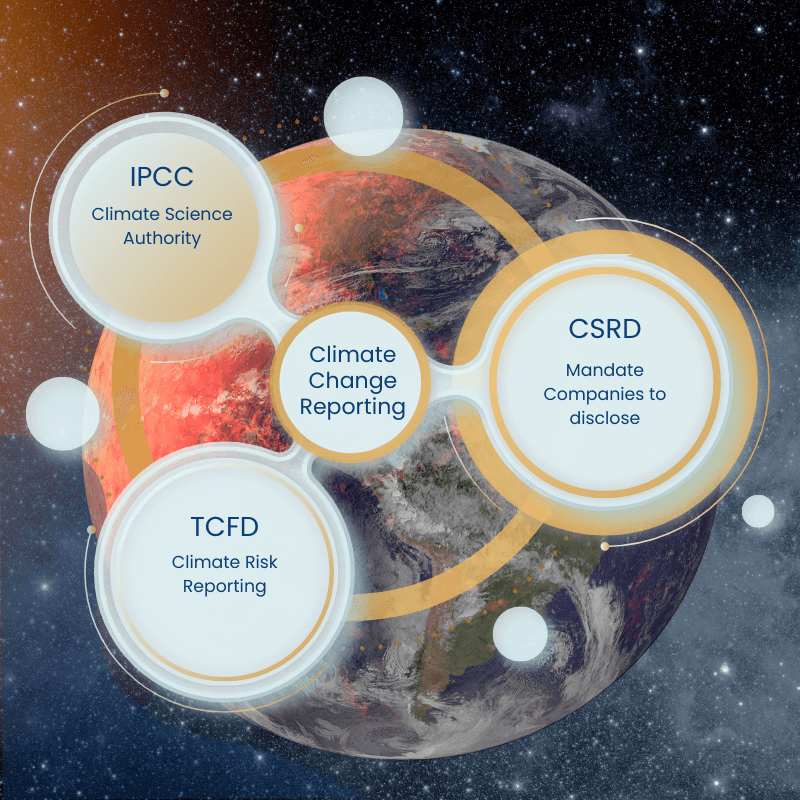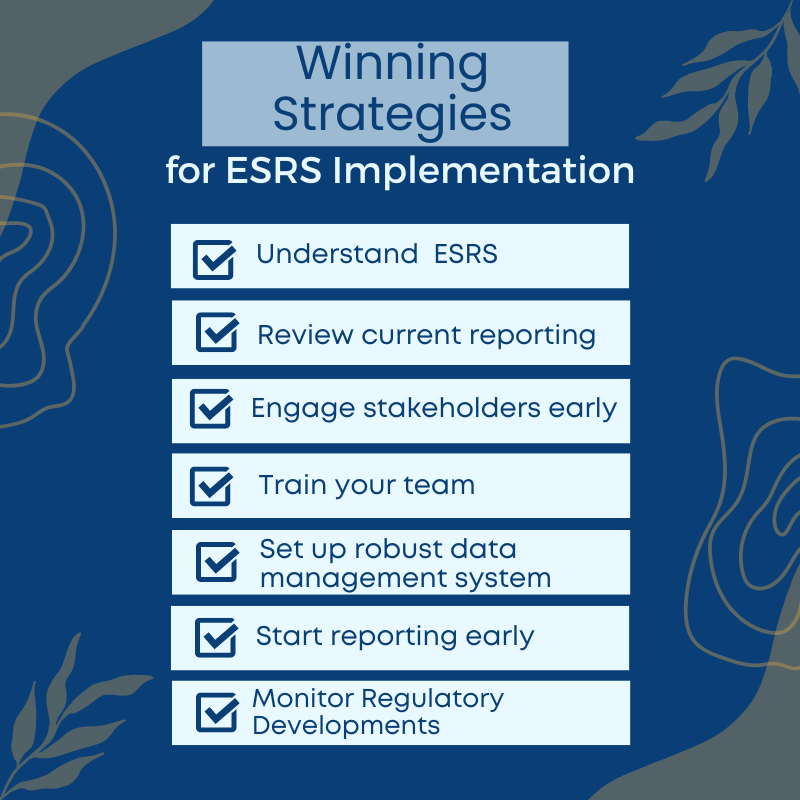The world of corporate sustainability has become increasingly relevant, and for good reason. Climate change isn’t merely a speculative, future issue! It is here , very visible and is causing a profound impact on our societies and ecosystems. Consequently, businesses can no longer afford to ignore their environmental footprint of their operations. In this light, we delve into the ‘CSRD: Prioritizing Climate Change Reporting’—a discussion around how the CSRD is emphasizing the importance of climate change reporting.
Understanding the CSRD
Before diving into the intersection of CSRD and climate change reporting, let’s take a brief look at what the CSRD is.
The Corporate Sustainability Reporting Directive (CSRD) is an EU directive that mandates companies operating in the EU to disclose non-financial, sustainability information. This policy aims to enhance the transparency of corporate behavior, allowing stakeholders to evaluate the sustainability and societal impact of businesses. By promoting better corporate behavior, the CSRD contributes to long-term economic growth and employment.
See our blog Unpacking the CSRD for a more detailed introduction to the directive.
Comprehending Climate Change
Climate change, a critical long-term change in global or regional climate patterns, is predominantly marked by the escalating global temperatures and extreme weather conditions. This is mainly a result of greenhouse gas emissions, notably carbon dioxide and methane, into the Earth’s atmosphere by human activities. This climate-related variation often called anthropogenic climate change or global warming, is profoundly affecting the earth’s climate system and global economy.
Today’s climate change is unparalleled in its pace, primarily propelled by human activities such as deforestation, fossil fuel combustion, heavy manufacturing sectors like concrete and steel making and intensive agriculture. These activities are increasing greenhouse gas concentrations, subsequently impacting various elements of our climate system, including air temperature, atmospheric pressure, humidity, precipitation, and wind patterns.
Climate change consequences are extensive, impacting ecosystems, biodiversity, human health, and socio-economic structures across the globe. The environmental impacts include rising sea levels due to melting polar ice caps, heightened occurrence of extreme weather events such as hurricanes and droughts, shifting wildlife populations and habitats, and an amplified risk of wildfires, amongst other issues.
Climate Change Reporting Unveiled
Climate change reporting is a critical process that entails communicating the impacts of climate change, risks, and responses to it. This can be through various media channels such as newspapers, television, radio, and online platforms or via scientific research publications. In the CSRD context, climate change reporting should be done through a rigorous sustainability reporting process.
The task force on climate-related financial disclosures (TCFD) plays an essential role in this process, encompassing a broad array of topics. From decoding scientific findings to detailing government policies and introducing innovative solutions, it translates the often complex climate-related terminologies into accessible information for the general public.
Effective climate change reporting provides balanced, accurate, and timely information on the causes, impacts, and potential mitigation strategies for this global crisis. It empowers individuals, communities, and policymakers to make informed decisions, thereby playing a pivotal role in addressing the climate risk to ensure a ‘just transition’ for all.
The Role of Disclosures in Climate Change Reporting
The task force on climate-related financial disclosures is instrumental in climate change reporting. Firstly, it raises public awareness about the urgency and the scale of the problem, bridging the gap between scientific understanding and public perception.
Moreover, reporting by the task force ensures accountability for governments and businesses by highlighting policies and practices that contribute to or mitigate climate change. It thereby promotes responsible behaviour across sectors.
With the publication and updates of the reports by the intergovernmental panel on climate change (IPCC), governments and large corporations became more aware of the climate issues and risks that the world is facing. These encourage companies to innovate and adjust strategies in order to reduce their GHG emissions to align with the Paris Agreement.
Finally, climate change reporting provides the necessary knowledge to individuals to understand their carbon footprint and make lifestyle changes that can reduce greenhouse gas emissions. It thus plays a significant role in addressing the worst impacts of climate change.
Gains from Climate Change Reporting
Climate change reporting offers myriad benefits. It supports informed decision-making at all levels – from individual choices about energy use, daily consumption to corporate strategic decisions and government policy-making. The climate-related disclosure requirements promote transparency and accountability, especially for businesses and governments.
As a result of public scrutiny driven by reporting, many organizations now disclose their greenhouse gas emissions and other environmental impacts. This fosters a culture of sustainability and builds public trust.
Lastly, climate change reporting can inspire action and innovation. Stories about successful climate initiatives, emerging low-carbon technologies, and transformative policies can motivate others and demonstrate that positive change is possible.
In summary, climate change is a pressing global issue that demands our collective attention. Effective climate change reporting can build awareness, promote accountability, inspire action, and empower everyone to contribute to mitigating its impacts. As the CSRD come into effect in 2023, it is crucial to acknowledge the importance of climate-related disclosures in this battle against climate change and act accordingly.
CSRD and Climate Change Reporting: A Powerful Duo

The CSRD encourages climate change reporting by emphasizing its importance in corporate sustainability reporting. This emphasis is made clear through the directive’s non-financial reporting requirements, which encompass various environmental matters. This is further supported by the five environmental standards in the set of 12 European Sustainability Reporting Standards (ESRS). Specifically, the Standard ESRS E1: Climate Change is the most comprehensive in the set and has mandatory disclosure requirements that companies subject to the directive must always report on.
This focus on climate change reporting within the CSRD is beneficial for multiple reasons. For one, it ensures businesses can be held accountable for their environmental impact. Moreover, it allows stakeholders to make informed decisions based on the disclosed information. It gives companies the opportunity to showcase their commitment to sustainability and demonstrate their strategies for managing climate-related risks and opportunities.
Challenges and Solutions in Climate Change Reporting
While the CSRD’s emphasis on climate change reporting is clear, it’s not without its challenges. For many businesses, identifying what climate-related information to report and how to gather this data can be daunting.
However, these challenges also present opportunities. Companies can leverage these obstacles as catalysts for improving their climate change strategies and reporting methodologies. Furthermore, the use of technology, such as AI and blockchain, can significantly aid in collecting, verifying, and reporting environmental data, thus ensuring transparency and accuracy in reporting.
See our blog “CSRD Compliance: The Role of Technology” and join the discussion of how technology can facilitate CSRD compliance.
Conclusion
In conclusion, climate change reporting is a key element of the CSRD, promoting corporate transparency, accountability, and sustainability. It provides an opportunity for businesses to demonstrate their commitment to combating climate change, as well as their resilience against its adverse impacts.
Despite the challenges associated with climate change reporting, the opportunities and benefits it presents are enormous. Companies can use these hurdles as a stepping stone towards better environmental stewardship and a more sustainable future. In this light, the CSRD’s emphasis on climate change reporting truly encapsulates the concept of ‘business for good.’
In a world increasingly affected by climate change, the role of businesses in addressing this crisis cannot be overstated. The CSRD’s focus on climate change reporting is a step in the right direction, encouraging corporations to strive for sustainable operations and contribute to a healthier, safer world.
Your Next Steps With CSRD and ESRS Sustainability Reporting
Get ready to lead the way towards a sustainable future with CSRD and ESRS Sustainability Reporting. Don’t wait any longer – it’s time to take action and position your company for success. Familiarize yourself and your team with the CSRD and ESRS reporting requirements today to ensure effective compliance and gain a strategic advantage in this evolving landscape.
Feeling overwhelmed? Don’t worry, you’re not alone. We’ve got you covered with a wealth of resources available on The CSRD Compass website. Explore in-depth guides, explanatory articles, comprehensive courses, and expert analyses all in one convenient place. The CSRD Compass is your ultimate destination for everything related to CSRD and ESRS.
Together, let’s embark on this transformative sustainability reporting journey, future-proof your business, and make a positive impact on our world. Your first step starts here, with The CSRD Compass.


